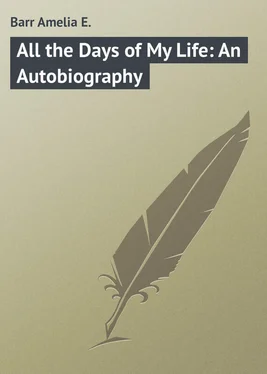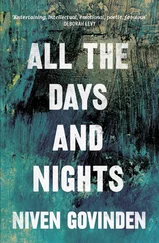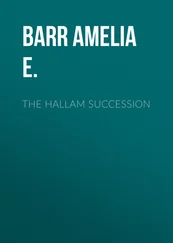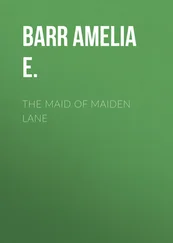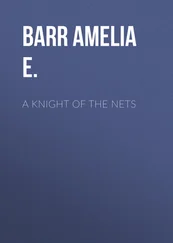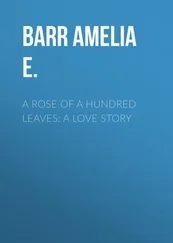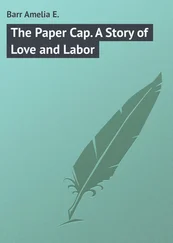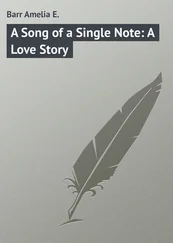Amelia Barr - All the Days of My Life - An Autobiography
Здесь есть возможность читать онлайн «Amelia Barr - All the Days of My Life - An Autobiography» — ознакомительный отрывок электронной книги совершенно бесплатно, а после прочтения отрывка купить полную версию. В некоторых случаях можно слушать аудио, скачать через торрент в формате fb2 и присутствует краткое содержание. Жанр: foreign_prose, foreign_language, на английском языке. Описание произведения, (предисловие) а так же отзывы посетителей доступны на портале библиотеки ЛибКат.
- Название:All the Days of My Life: An Autobiography
- Автор:
- Жанр:
- Год:неизвестен
- ISBN:нет данных
- Рейтинг книги:5 / 5. Голосов: 1
-
Избранное:Добавить в избранное
- Отзывы:
-
Ваша оценка:
- 100
- 1
- 2
- 3
- 4
- 5
All the Days of My Life: An Autobiography: краткое содержание, описание и аннотация
Предлагаем к чтению аннотацию, описание, краткое содержание или предисловие (зависит от того, что написал сам автор книги «All the Days of My Life: An Autobiography»). Если вы не нашли необходимую информацию о книге — напишите в комментариях, мы постараемся отыскать её.
All the Days of My Life: An Autobiography — читать онлайн ознакомительный отрывок
Ниже представлен текст книги, разбитый по страницам. Система сохранения места последней прочитанной страницы, позволяет с удобством читать онлайн бесплатно книгу «All the Days of My Life: An Autobiography», без необходимости каждый раз заново искать на чём Вы остановились. Поставьте закладку, и сможете в любой момент перейти на страницу, на которой закончили чтение.
Интервал:
Закладка:
Soon after we removed to Shipley a woman came into our lives, called Ann Oddy, and my sister and I were told to be respectful to her and to obey her orders. She was a clever housekeeper, a superior cook, and had many domestic virtues; but she was authoritative, tyrannical, and quite determined to have things her own way. Fortunately I won her favor early, and for two simple reasons: first, my hair was easy to curl, and Sister Jane’s had to be carefully put in papers, and then did not “keep in.” Second, because she thought Jane was always ready to go “neighboring” with Mother, and then was so secret as to where she had been, and so “know nothing” of what was said; but I was better pleased to stay in the children’s room with a book and herself for company.
Indeed I liked Ann’s society. She had a grewsome assortment of stories, chiefly about bad fellows and their young women, but sometimes concerning bad children who had come to grief for disobeying their good parents, or for breaking the Sabbath Day. There was generally, however, an enthralling climax, relating to a handsome young man, whom she saw hanged at York Castle for murdering his sweetheart. At this narration I usually laid down my book, and listened with trembling interest to the awful fate of this faithless lover, and Ann’s warnings against men of all kinds who wanted helpless women to marry them. In those days I felt sure Ann Oddy had the true wisdom, and was quite resolved to look upon all handsome young men as probable murderers.
The three years I spent at Shipley were happy years. I enjoyed every hour of them, though the days were twenty times as long as days are now. There was a great deal of visiting, and visiting meant privileges of all kinds. We were frequently asked out to tea with our parents, especially if there were children in the house to which we were going, and there were children’s parties nearly every week at somebody’s house.
It was a good thing, then, that our usual fare was very plain, and not even the quantity left to our own desire or discretion. Breakfast was always a bowl of bread and milk boiled, and a rather thick slice of bread and butter after it. Fresh meat was sparingly given us at dinner, but we had plenty of broth, vegetables, and Yorkshire pudding. Our evening meal was bread and milk, rice or tapioca pudding, and a thick slice of sweet loaf – that is, bread made with currants, and caraway seeds, and a little sugar. But when we went out for dinner or tea, we had our share of the good things going; and, if the company was at our house, Ann Oddy usually put a couple of Christ Church tarts, or cheesecakes, among our plain bread. She always pretended to wonder where they came from; and, if I said pleadingly, “Don’t take them away, Ann,” she would answer in a kind of musing manner, “I’ll be bound the Missis put them there. Some people will meddle.” Then Jane would help herself, and I did the same, and we both knew that Ann had put the tarts there, and that she intended us to eat them. Yet this same little pretense of surprise was kept up for many years, and I grew to enjoy the making of it more perfect, and the changing of the words a little.
The house at which I liked best of all to visit was that of Jonathan Greenwood. He had a pretty place – with a fine strawberry bed – at Baildon Green. He was then a handsome bachelor of about forty years of age, and I considered him quite an old man. I knew also that he was Miss Crabtree’s sweetheart, and Ann’s look of disapproval, and the suspicious shake of her head made me anxious about both of them. What if Miss Crabtree should have another sweetheart! And what if Jonathan killed her because she had deceived him! Then there might be the York tragedy over again. These thoughts troubled me so much that I ventured to suggest their probability to Ann. She laughed my fears to scorn.
“Martha Crabtree have another sweetheart! Nay, never my little lass! It will be the priest, not the hangman, that will tie Jonathan up.”
“Tie Jonathan up, Ann!” I ejaculated.
“To be sure,” she answered. “Stop talking.”
“But, Ann – ”
“Do as I bid you.”
Then I resolved to ask Jonathan that afternoon. It was Thursday, and he would be sure to call for a cup of tea as he came from Leeds market. I did not do so, because he asked permission for me to go to Baildon Green with him, and stay until after the fair, and during the visit I knew I should find many better opportunities for the question. To go to Baildon Green, was the best holiday that came to me, unless it was to go to Mr. Samuel Wilson’s, at the village of Baildon. He had a much finer house, and a large shop in which there were raisins and Jordan almonds, and he had also a handsome little son of my own age, with whom I loved to play. But one visit generally included the other, and both were very agreeable to all my desires.
At Baildon Green I had many pleasures. I liked to be petted and praised and to hear the women say, “What a pretty child it is! God bless it!” and I liked to hang around them, and listen to their conversation as they made nice little dinners. I liked in the evening to look at the Penny Magazine , and to have Mr. Greenwood explain the pictures to me, and I certainly liked to go with him in his gig to Leeds on Leeds market day. Sometimes he took me with him into the Cloth Hall; sometimes also men would say, “Why, Jonathan, whose little lass is that?” And he would answer, “It is Mr. Huddleston’s little lass.” “ Never! ” would be the ejaculation, but I knew the word was not intended for dissent, but somehow for approval.
When I was at Baildon Green Saturday was the great day. Very early in the morning the weavers began to arrive with the web of cloth they had woven during the week. In those days there were no mills – all the cloth was made in the weavers’ homes. Baildon Green was a weaving village. In every cottage there was a loom and a big spinning wheel. The men worked at the loom, the women and children at the wheel. At daybreak I could hear the shuttles flying, and the rattle of the unwieldy looms in every house. On Saturday they brought their webs to Jonathan Greenwood. He examined each web carefully, measured its length, and paid the weaver whatever was its value. Then, giving him the woolen yarn necessary for next week’s web, he was ready to call another weaver. There were perhaps twenty to thirty men present, and, during these examinations many little disputes arose. I enjoyed them. The men called the master “Jonathan,” and talked to him in language as plain, or plainer, than he gave them. Sometimes, after a deal of threaping, the master would lose his temper, then I noticed he always got the best of the argument. In the room where this business took place there was a big pair of scales, and I usually sat in them, swinging gently to and fro, and listening.
These weavers were all big men, the master bigger than any of them; and they all wore blue-checked linen pinafores covering them from neck to feet. Underneath this pinafore the master wore fine broadcloth and high shoes with silver latchets. I do not know what kind of cloth the men wore, but it was very probably corduroy, as that was then the usual material for workingmen’s clothes, and on their feet were heavy clogs clasped with brass, a footgear capable of giving a very ugly and even dangerous kick.
I have never seen a prouder or more independent class of men than these home weavers; and just at this time they had been made anxious and irritable by the constant reports of coming mills and weaving by machinery. But their religion kept them hopeful and confident, for they were all Methodists, made for Methodists, and Methodism made for them. And it was a great sight on a Sabbath morning to see them gathering in their chapel, full of that incompatible spiritual joy which no one understands but those who have it, and which I at that time, took for simple good temper. But I know now that if I was a preacher of the Word, I would not ask to be sent to an analyzing, argumentative, cold Scotch kirk; nor to a complacent, satisfied English church; nor even to a meditative, tranquil Quaker meeting-house; I would say, “Send me to an inspiring, joyful, West Riding Methodist chapel.”
Читать дальшеИнтервал:
Закладка:
Похожие книги на «All the Days of My Life: An Autobiography»
Представляем Вашему вниманию похожие книги на «All the Days of My Life: An Autobiography» списком для выбора. Мы отобрали схожую по названию и смыслу литературу в надежде предоставить читателям больше вариантов отыскать новые, интересные, ещё непрочитанные произведения.
Обсуждение, отзывы о книге «All the Days of My Life: An Autobiography» и просто собственные мнения читателей. Оставьте ваши комментарии, напишите, что Вы думаете о произведении, его смысле или главных героях. Укажите что конкретно понравилось, а что нет, и почему Вы так считаете.
